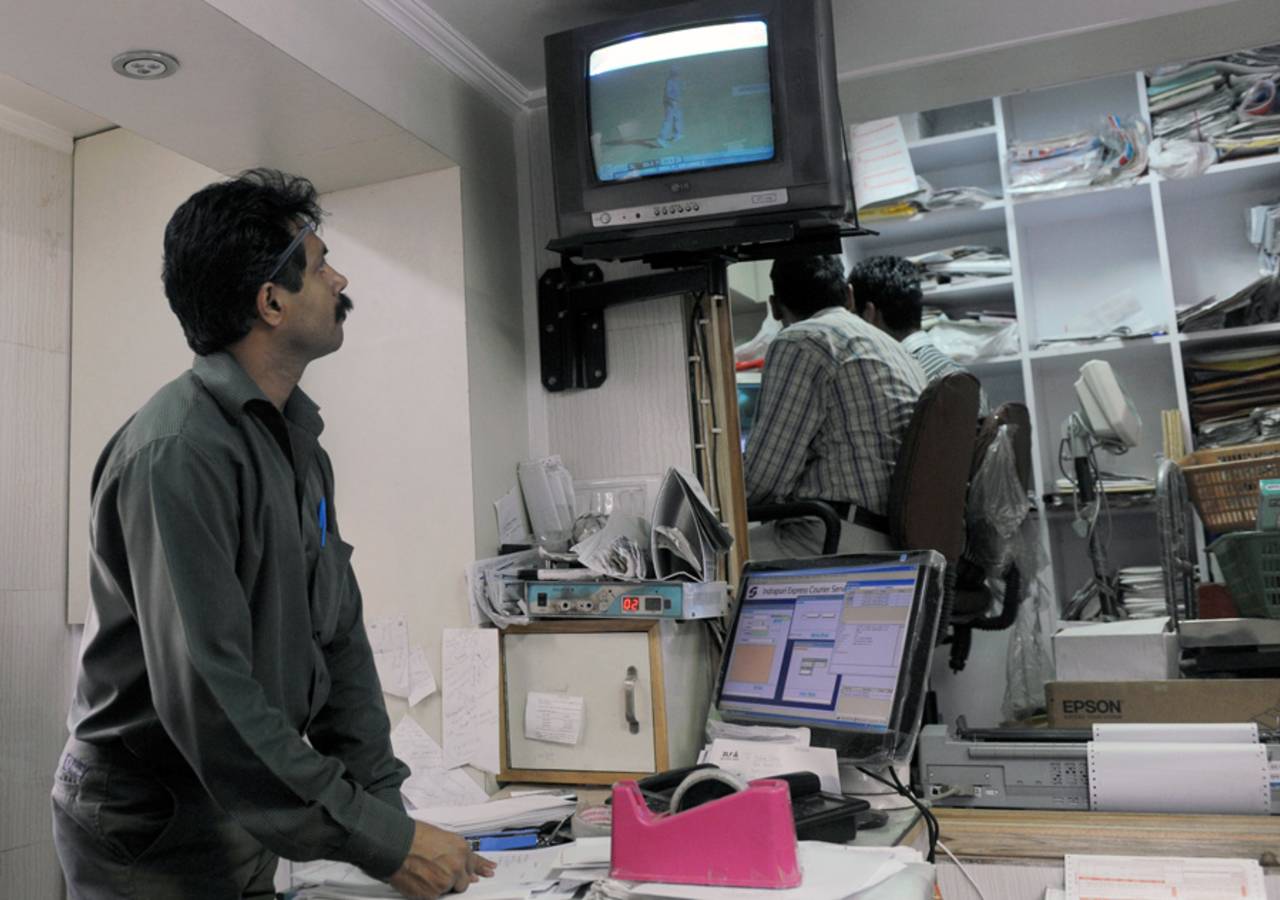Why can't broadcasters clean up Indian cricket?
It's in sports television's long-term interest to ensure that the game is run well and free of scandal
Subash Jayaraman
11-May-2014

Broadcasters control the revenue model of cricket • AFP
Donald Sterling, the owner of the NBA franchise Los Angeles Clippers, was banned for life from the NBA for racist comments he made recently. More than the ban itself, the events leading up to it are of significance to us cricket fans.
There was plenty of public outrage over Sterling's offensive comments but some of the more decisive ones came from the NBA players, their union, and from corporate America.
LA Clippers were in the middle of their first round of playoff games when the scandal broke. The players made a statement ahead of game five by discarding their warm-up jerseys in the middle of the court and wearing their game jerseys inside out. Several active players, including Clippers' Chris Paul, who is the president of the NBA players association (NBPA), made statements in the media about their displeasure and outrage over Sterling's statements. The NBPA called on the NBA commissioner to suspend Sterling, which would include a ban from games and a removal from basketball operations, and also for the maximum possible fine. It got them all.
Considerable pressure was brought to bear, with many national newspapers, TV and radio stations and websites carrying the story front and centre. The followers of NBA and a vast cross-section of the American public found their voices were heard.
With public opinion firmly against Sterling, it wasn't long before sponsors started cutting ties. Eleven corporate entities suspended their sponsorship and advertising obligations.
Three days after the scandal broke, Adam Silver, the commissioner, announced that Sterling was "banned for life" from the NBA, effective immediately, and was fined US$2.5 million. The commissioner said he was going to push the other 29 team owners to vote to have Sterling give up ownership of the franchise, a decision expected to go through.
Now let's look over at cricket, in India, specifically. N Srinivasan had to be ordered by the Supreme Court to stay away from the affairs of the BCCI for the probe into spot-fixing in the IPL to be completed unhindered and uninfluenced. There are two franchises whose owners/principals have been mired in controversy but nothing has been done by the IPL General Council to censure those franchises, though there are provisions in the league's constitution that allow such action to be taken.
Public confidence in cricket must be at a low, perhaps matching the depths reached during the match-fixing scandals of 2000. Yet the players have said nothing about it. Journalists have been flatly refused the chance to ask questions about the issue, or are met with cold "no comments".
This is the same governing council and board that banned five players after just a cursory review into allegations of spot-fixing as reported in a TV sting in 2012. When law-enforcement authorities arrested IPL players, including Sreesanth, in 2013, those players too were quickly banished. However, the need for swift justice and the haste to show fans the league is clean somehow doesn't seem to apply when it comes to board officials and IPL franchise owners.
It is understandable to a degree why marquee Indian players won't voice their opinions on this issue, as there is no player association or union backing them, and any independent voice faces the possibility of getting blackballed. The cricket ecosystem is such that members of the media have to suck at the teats of the boards, so they can't go overboard with their criticism either.
Who else can bell Indian cricket's fat cats?
In cricket, the revenue model is driven by broadcasters. In fact, the recent restructuring of the ICC governance set-up was as much a need for the Big Three to make their positions that much stronger as it was to make the scheduling for the upcoming broadcast deals attractive. The broadcasters sealed the fate of the Test Championship, impractical as it was from the get go, and the ICC decided to reinstate the Champions Trophy because the broadcasters liked it.
It is undeniable that broadcasters hold significant sway in all matters cricketing, and they could lead the way in ensuring cricket is clean. The audience needs to know that cricket is in good hands and is run well, and that what they see on TV isn't WWE. Therefore it is in the broadcasters' long-term interest that cricket is run in a transparent manner and that the fans have their faith in it restored.
Of course, it's also the right thing to do morally. To paraphrase Google's philosophy: If you make good quality things that work well, more people will use them, which is good for you in the long run, and that means forgoing profits occasionally.
The sponsors of Indian and world cricket need to step up as well, and this is where fans can play a big role. By putting pressure on the major (and minor) sponsors of the IPL, for example, fans can get the league and the boards to clean up their act.
Despite all the recent scandals, none of the sponsors seems to have distanced themselves from the IPL - not even a global brand like Pepsi. Corporates ought to take a cue from the NBA to cause change for the better. If social media can be a driver of revolution across a continent, it isn't too farfetched to think it can be of use to set the sport we love so dearly straight, is it?